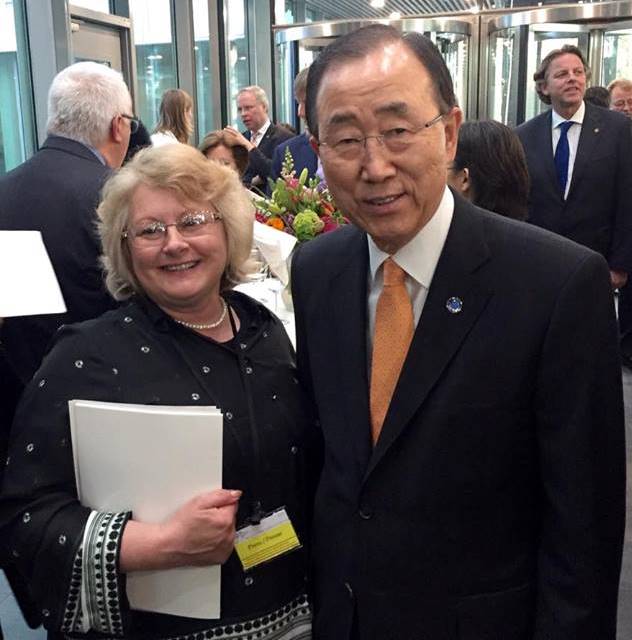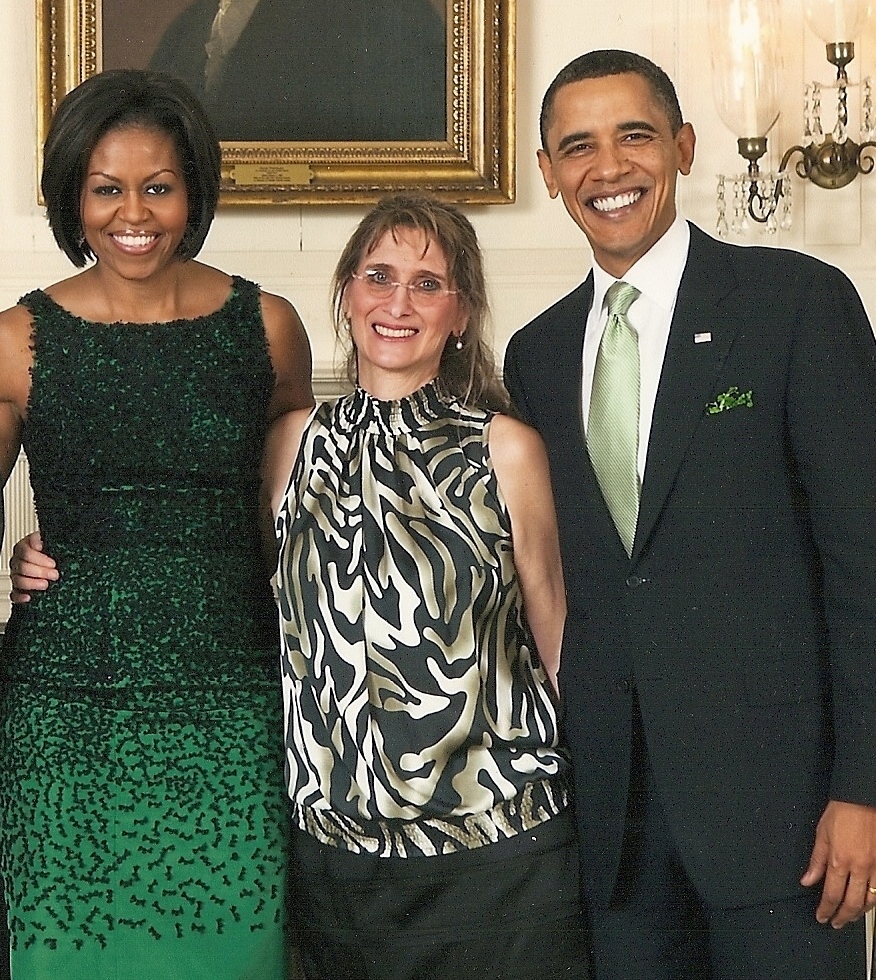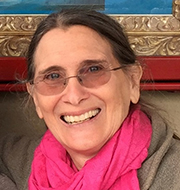 Guest post by Cynthia Lardner who interviewed Nadine B. Hack -“I had the opportunity to interview a woman I admire tremendously and we had a wonderful conversation about how she came to be a woman of conviction respected globally.”
Guest post by Cynthia Lardner who interviewed Nadine B. Hack -“I had the opportunity to interview a woman I admire tremendously and we had a wonderful conversation about how she came to be a woman of conviction respected globally.”
CL: What influenced you when you were young and who were your role models?
NBH: My grandmother was an extraordinary woman, dedicated to helping others. She immigrated to the US from what was then Russia (now Ukraine) to escape Tsarist pogroms. I grew up in an building where our extended family lived (her brothers, sisters, their children and grandchildren). She taught me that when I went to the bakery I should ask the price of today and yesterday’s bread: then, after buying yesterday’s, I should take whatever pennies I saved and put them in a jar above the “icebox” (what she called the refrigerator) so we could give it to poorer people. I learned from her that charity didn’t only begin when one had material wealth but was the right thing to do always.
I was a young woman when the early 1960s civil rights, women’s rights and then peace movements were in their full. I was profoundly affected by Dr. Martin Luther King’s 1963 I Have a Dream speech in DC. I was motivated to help build the “beloved community” he spoke of so eloquently and I’ve been working towards that ever since. I also had the opportunity to work with two extraordinary women who, like King, were committed to the dignity of all human beings: Bella Abzug, nicknamed “Battling Bella,” and Shirley Chisholm, the first Black woman in the US Congress. I met Bella through Women Strike for Peace and I met Shirley via the League of Women Voters.
What inspired me so deeply about the three of them is that they understood that sexism, racism and militarism were inextricably interconnected, so to eliminate any of these injustices you had to work to resolve all of them. They reminded me of how when the suffragettes and the abolitionists worked together they had strength that became weakened when the movements fractured. I learned an early lesson about the importance of building coalitions that I’ve continued to do in whatever setting I’ve worked in: the power of the “we” always is stronger than the “I.”
This is one of the many reasons I’ve worked so hard to bring disparate people together to better understand each other. Decades later I had the honor to work with Nelson Mandela, who after 27 brutal years in prison, emerged as a fervent advocate of engaging with the very people and institutions that oppressed him.
CL: As reflected in your TEDx Adversaries to Allies, where the organizers called you a master bridge-builder, what precipitated your understanding of the four points you highlighted; including revealing one’s own humanity?
NBH: We can learn much from King, Mandela, Abzug and Chisholm, but it would be defeatist to think you must be extraordinary like them to be form engaged relationships, even with adversaries. My work on engagement leadership and its unique framework Strategic Relational Engagement (SRE™) is based on decades of real-life success in bringing together wildly diverse stakeholders to find common ground and achieve great goals.
The story I tell in my TEDx is about how in the 1970s I got loggers to work with environmentalists and government at a time when all three were arch enemies. My first point was: Be honest and clear. This seems so obvious but I can’t tell you the number of times I’ve seen collaborations fail because people simply weren’t really explicit with each other – or even themselves – about their expectations. My second was: Go beyond territorial positions. Let me be clear: it is not easy for anyone to go outside the boundaries of what one’s constituents perceived as appropriate, but it always has a direct benefit when people are brave enough to do so.
My third was: Offer ongoing nurturing. Engagement is not a one-shot deal: it requires consistent sustenance. This sounds ridiculously obvious, but how many people really invest the time and energy to commit to engaged relationships that are challenging? And my fourth point that you asked about was: Reveal your humanity. Beyond all the many logic-based benefits, it always is the human dimension that really makes anything work. People need to experience that they more in common than they thought and you can help to create the intimacy that allows that to happen. It’s what I try to do whether I’m providing group facilitation or one-on-one coaching.
Even people sitting in cubicles side-by-side often are separated by a great divide. I recently gave a talk about engaging to several hundred participants at an international conference. In it, I lead the audience towards how they can more fully reveal their humanity even in a one and half minute introduction to the stranger sitting next to them. After my first request to them to do so, many just told their name, where they’re from and what their job is. That’s like the military code of conduct for captured prisoners of war: just give your “name, rank and serial number” right? They’d just revealed the most minimal amount of information about themselves possible.
I then asked them, “How do you feel now? Do you really know this new person? Do they really know you?” So, I invited them to take a deep breath and go inside. “Think about and/or feel who you really are in this moment. What brings you the greatest joy? What makes you most sad? What excites or intrigues you. Just reflect quietly for a moment: you know what’s going on in you.” And, then I asked them to do it stay connected to what they’d just discovered, turn back to that same person as if they’d never met and re-introduce themselves. The changed energy in the room was palpable as they truly connected the second time around.
CL: Describe your approach to professional mentoring?
NBH: I always try to put myself in the other person’s shoes non-judgmentally and actually understand where they are coming from and why they have the beliefs and behaviors that they do. Then, I ask them probative questions that open the door to the possibility that they can see others that way. I often explain that you can never really change anything on the outside (i.e.: what anyone does or anything that might happen). The only thing you can change is how you respond to external behaviors and activities. To do so requires enormous honesty: I wrote about this in a piece, Being Self-Aware and Truthful.
I have found that self-awareness is the most fundamental dimension for authentic purposeful leadership. Can you to look into your own mirror with clarity and honesty about what examples you are setting on a daily, if not hourly, basis? Are you being open, transparent and do you bring your whole self to the table, including your vulnerabilities and shortcomings? While people’s first tendency is to look for the problems “outside” usually when they switch the lens to internal reflection, they discover truly profound things about themselves – both limiting and enabling – that allow them to focus on what they can change to create the effect or achieve the goal they seek.
We’re often told that strength means something very different than this but my experience is that the strongest among us are willing to be candid about our weaknesses. In fact, that very act inspires a deeper level of trust and respect among those we lead. And, in doing so, we also empower them to take leadership in areas where they might have greater competency than us.
But, this requires a tremendous level of self-confidence: not a phony aura of confidence but a genuine soul sense of what we know, what we don’t; who we are, who we’re not. In my growth over many decades, I found that these moments, which I call “sacred intimacy,” are completely appropriate in a professional context and offer a context for extraordinary transformation.
In my coaching and mentoring, I seek to create that sacred intimacy. We constantly hear and say the buzz-phrases – co-creation, collaboration across silos, build capacity – but we often hesitate from actually engaging with others in the open, candid way that would enable those concepts to come to life. Think about what’s holding you back. Find a small thing you can do differently to start to build new “muscles” in your undeveloped realms.
CL: Drawing on your experience, how can female executives put what you’ve learned into practice and what advice would you offer especially to a young woman just embarking on her own career?
NBH: My mantra: be yourself (you can never be anyone else anyway no matter how hard you try)! Don’t mimic what we think of as classic male behavior and don’t try to be an idealized conception of what we think a woman leader is: who you are is enough and it’s your unique gift to the world.
Let me be clear: while being true to yourself, you always can stretch your repertoire to include a broader spectrum. But, before you can do that, you must acknowledge to yourself where you might need stretching. For me, it’s patience. I’m fast and to the point: not everyone can respond to that well. So, I continue to work on calibrating accordingly.
I work on that and many other things that can make me more present, more trust-able, more my full self. I feel freer each day to acknowledge how and where I can grow while I also know how to genuinely own the ways in which I am gifted. I continue to search for the space between feeling overly inflated with self-satisfaction or completely unworthy.
I’ve become a better leader because of this ongoing self-awareness. I no longer need the external validation (although it’s nice to receive). I can feel it in my bones when I’m facilitating leadership development programs, organizational change management initiatives, one-one-one executive coaching and just in my simple daily interactions with everyone I meet.
While I’m emphasizing the critical internal work I believe we each must do, I don’t mean to minimize the realities of sexism in the workplace (and everywhere else). So, my second mantra is: don’t let anyone else define you, ever! Only you know who you really are and what you’re capable of: even if others try to dismiss you, don’t internalize their misperception of you being unimportant or un-valuable. Claim your authority and autonomy: stand in your strength and hold your ground!
After I recently extolled a young woman’s impressive work, she said I “stand on your shoulders.” I told her that we were part of a chain that stretched far behind us and would continue long after us. When I was young, I believed it was a sprint and we would change it all right then. As I grew older, I realized it was a marathon and I had to pace myself to be in it for the long haul.
And, then as I grew even older, I realized it is a relay race. I’ve only been able to do what I’ve done because of those who came earlier and passed me the baton (like Bella and Shirley). I may not see the fruition of all I’ve worked towards but I have a solemn responsibility to carry it forward. My very trustworthiness turns on that. I delight at the prospect of what younger generations of women (and men) will achieve and I’m cheering them on!
—–
 This interview by Cynthia Lardner was first published in E The Magazine for Today’s Female Executive
This interview by Cynthia Lardner was first published in E The Magazine for Today’s Female Executive
Interviewer: Cynthia M. Lardner, J.D., M.A., holds a journalism degree, she is a licensed attorney and trained clinical therapist. Her philosophy is to collectively influence conscious global thinking understanding that everything and everyone is subject to change given the right circumstances: Standard Theory or Theory of Everything. Ms. Lardner has accounts on Twitter, Facebook, Google Plus and LinkedIn, as well as accounts under the pseudonym Deveroux Cleary, and is globally ranked in the top 1% of all account holders for her outreach and influence. Having just relocated to The Hague, she currently is looking for a challenging position that will fully utilize her collective skill set.
Interviewee: Nadine B. Hack, named Top 100 Thought Leader Trustworthy Business Behaviour often enough to earn Lifetime Achievement Award in Trust, is CEO beCause Global Consulting. She advises Fortune 500 company executives, heads of state, and other leaders and organizations on clarifying their goals and tackling obstacles to achieve them. She was first woman Executive-in-Residence at IMD Business School where she maintains an affiliation. Global CEO ranked her in Top 100 Corporate Social Responsibility Leaders. Featured on Atlantic Speaker Bureau, Hack gives keynotes at conferences and makes private presentations for boards and senior executives.



